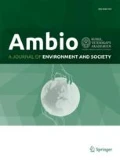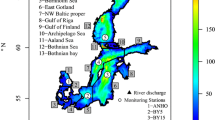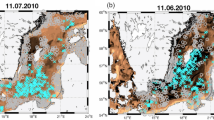Abstract
Aiming to inform both marine management and the public, coupled environmental-climate scenario simulations for the future Baltic Sea are analyzed. The projections are performed under two greenhouse gas concentration scenarios (medium and high-end) and three nutrient load scenarios spanning the range of plausible socio-economic pathways. Assuming an optimistic scenario with perfect implementation of the Baltic Sea Action Plan (BSAP), the projections suggest that the achievement of Good Environmental Status will take at least a few more decades. However, for the perception of the attractiveness of beach recreational sites, extreme events such as tropical nights, record-breaking sea surface temperature (SST), and cyanobacteria blooms may be more important than mean ecosystem indicators. Our projections suggest that the incidence of record-breaking summer SSTs will increase significantly. Under the BSAP, record-breaking cyanobacteria blooms will no longer occur in the future, but may reappear at the end of the century in a business-as-usual nutrient load scenario.





Similar content being viewed by others
References
Bigano, A., A. Goria, J. Hamilton, and R.S.J. Tol. 2005. The Effect of Climate Change and Extreme Weather Events on Tourism. Report. https://papers.ssrn.com/sol3/papers.cfm?abstract_id=673453.
Bigano, A., J.M. Hamilton, and R.S.J. Tol. 2006. The impact of climate on holiday destination Choice. Climatic Change 76: 389. https://doi.org/10.1007/s10584-005-9015-0.
Carstensen, J., J.H. Andersen, B.G. Gustafsson, and D.J. Conley. 2014. Deoxygenation of the Baltic Sea during the last century. Proceedings of the National Academy of Sciences of the United States of America 111: 5628–5633. https://doi.org/10.1073/pnas.1323156111.
Eilola, K., H.E.M. Meier, and E. Almroth. 2009. On the dynamics of oxygen, phosphorus and cyanobacteria in the Baltic Sea: A model study. Journal of Marine Systems 75: 163–184. https://doi.org/10.1016/j.jmarsys.2008.08.009.
Eilola, K., E. Almroth-Rosell, and H.E.M. Meier. 2014. Impact of saltwater inflows on phosphorus cycling and eutrophication in the Baltic Sea: A 3D model study. Tellus A 66: 23985. https://doi.org/10.3402/tellusa.v66.23985.
Fischer, E.M., and C. Schär. 2010. Consistent geographical patterns of changes in high-impact European heatwaves. Nature Geoscience 3: 398.
Fleming-Lehtinen, V., and M. Laamanen. 2012. Long-term changes in Secchi depth and the role of phytoplankton in explaining light attenuation in the Baltic Sea. Estuarine, Coastal and Shelf Science 102: 1–10.
HELCOM. 2013a. Copenhagen Ministerial Declaration, HELCOM Ministerial Meeting, Copenhagen, Denmark.
HELCOM. 2013b. Approaches and methods for eutrophication target setting in the Baltic Sea region. Baltic Sea Environment Proceedings 133.
HELCOM. 2018. State of the Baltic Sea – Second HELCOM holistic assessment 2011–2016. Baltic Sea Environment Proceedings 155. ISSN 0357-2994. http://www.helcom.fi/baltic-sea-trends/holistic-assessments/state-of-the-baltic-sea-2018/reports-and-materials/.
Kahru, M., and R. Elmgren. 2014. Multidecadal time series of satellite-detected accumulations of cyanobacteria in the Baltic Sea. Biogeosciences 11: 3619–3633. https://doi.org/10.5194/bg-11-3619-2014.
Kenney, M.A., A.C. Janetos, et al. 2014. National Climate Indicators System Report. National Climate Assessment and Development Advisory Committee.
Lehmann, J., D. Coumou, and K. Frieler. 2015. Increased record-breaking precipitation events under global warming. Climatic Change 132: 501. https://doi.org/10.1007/s10584-015-1434-y.
Meier, H.E.M., R. Döscher, and T. Faxén. 2003. A multiprocessor coupled ice-ocean model for the Baltic Sea: Application to salt inflow. Journal of Geophysical Research 108: 3273. https://doi.org/10.1029/2000JC000521.
Meier, H.E.M., H.C. Andersson, K. Eilola, B.G. Gustafsson, I. Kuznetsov, B. Müller-Karulis, T. Neumann, and O.P. Savchuk. 2011a. Hypoxia in future climates: A model ensemble study for the Baltic Sea. Geophysical Research Letters 38: L24608. https://doi.org/10.1029/2011GL049929.
Meier, H.E.M., K. Eilola, and E. Almroth. 2011b. Climate-related changes in marine ecosystems simulated with a three-dimensional coupled biogeochemical-physical model of the Baltic Sea. Climate Research 48: 31–55.
Meier, H.E.M., K. Eilola, E. Almroth-Rosell, S. Schimanke, M. Kniebusch, A. Höglund, P. Pemberton, Y. Liu, et al. 2019a. Disentangling the impact of nutrient load and climate changes on Baltic Sea hypoxia and eutrophication since 1850. Climate Dynamics 53: 1145–1166. https://doi.org/10.1007/s00382-018-4296-y.
Meier, H.E.M., K. Eilola, E. Almroth-Rosell, S. Schimanke, M. Kniebusch, A. Höglund, P. Pemberton, Y. Liu, et al. 2019b. Correction to: Disentangling the impact of nutrient load and climate changes on Baltic Sea hypoxia and eutrophication since 1850. Climate Dynamics 53: 1167–1169. https://doi.org/10.1007/s00382-018-4483-x.
Moss, R.H., J.A. Edmonds, K.A. Hibbard, M.R. Manning, S.K. Rose, D.P. Van Vuuren, T.R. Carter, S. Emori, et al. 2010. The next generation of scenarios for climate change research and assessment. Nature 463: 747–756.
Neumann, T., K. Eilola, B. Gustafsson, B. Müller-Karulis, I. Kuznetsov, H.E.M. Meier, and O.P. Savchuk. 2012. Extremes of temperature, oxygen and blooms in the Baltic Sea in a changing climate. Ambio 41: 574–585. https://doi.org/10.1007/s13280-012-0321-2.
Patz, J.A., D. Campbell-Lendrum, T. Holloway, and J.A. Foley. 2005. Impact of regional climate change on human health. Nature 438: 310–317.
Pithan, F., and T. Mauritsen. 2014. Arctic amplification dominated by temperature feedbacks in contemporary climate models. Nature Geoscience 7: 181.
Rabalais, N.N., R.J. Díaz, L.A. Levin, R.E. Turner, D. Gilbert, and J. Zhang. 2010. Dynamics and distribution of natural and human-caused hypoxia. Biogeosciences 7: 585–619. https://doi.org/10.5194/bg-7-585-2010.
Saraiva, S., H.E.M. Meier, H. Andersson, A. Höglund, C. Dieterich, M. Gröger, R. Hordoir, and K. Eilola. 2019. Uncertainties in projections of the Baltic Sea ecosystem driven by an ensemble of global climate models. Frontiers in Earth Science 6: 244. https://doi.org/10.3389/feart.2018.00244.
Savchuk, O.P., U. Larsson, L. Elmgren, and M. Rodriguez Medina. 2006. Secchi depth and nutrient concentration in the Baltic Sea: model regressions for MARE’s Nest. Department of Systems Ecology, Stockholm University. Technical Report. Stockholm, Sweden.
Scott, D., S. Gössling, and C.M. Hall. 2012. International tourism and climate change. WIREs Climate Change 3: 213–232. https://doi.org/10.1002/wcc.165.
Sherman, K., M. Sissenwine, V. Christensen, A. Duda, G. Hempel, C. Ibe, S. Levin, D. Lluch-Belda, et al. 2005. A global movement toward an ecosystem approach to management of marine resources. Marine Ecology Progress Series 300: 275–279.
UNWTO and UNEP. 2008. Climate Change and Tourism – Responding to Global Challenges. World Tourism Organization and the United Nations Environment Programme, Madrid, Spain. ISBN: 978-92-844-1234-1 (UNWTO), ISBN: 978-92-807-2886-6 (UNEP). https://sdt.unwto.org/sites/all/files/docpdf/climate2008.pdf.
Acknowledgements
The research presented in this study is part of the Baltic Earth program (Earth System Science for the Baltic Sea region, see http://www.baltic.earth) and was funded by the BONUS BalticAPP (Well-being from the Baltic Sea—applications combining natural science and economics) project which has received funding from BONUS, the joint Baltic Sea research and development programme (Art 185), funded jointly from the European Union’s Seventh Programme for research, technological development and demonstration and from the Swedish Research Council for Environment, Agricultural Sciences and Spatial Planning (FORMAS, Grant No. 942-2015-23). Additional support by FORMAS within the projects “Cyanobacteria life cycles and nitrogen fixation in historical reconstructions and future climate scenarios (1850–2100) of the Baltic Sea” (Grant No. 214-2013-1449) and “ClimeMarine” within the framework of the National Research Programme for Climate (Grant No. 2017-01949) is acknowledged. Further, we acknowledge Ann-Turi Skjevik who helped to identify the large filamentous nitrogen fixing cyanobacteria selected for the model evaluation and one anonymous reviewer and the Guest Editor, Dr. Jim Smart, who helped with constructive comments to improve the manuscript considerably.
Author information
Authors and Affiliations
Corresponding author
Additional information
Publisher's Note
Springer Nature remains neutral with regard to jurisdictional claims in published maps and institutional affiliations.
Electronic supplementary material
Below is the link to the electronic supplementary material.
Rights and permissions
About this article
Cite this article
Meier, H.E.M., Dieterich, C., Eilola, K. et al. Future projections of record-breaking sea surface temperature and cyanobacteria bloom events in the Baltic Sea. Ambio 48, 1362–1376 (2019). https://doi.org/10.1007/s13280-019-01235-5
Received:
Revised:
Accepted:
Published:
Issue Date:
DOI: https://doi.org/10.1007/s13280-019-01235-5




